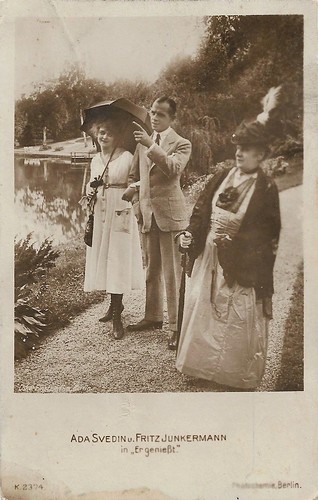
German postcard by Photochemie, no. K. 1556. Photo: W. Willinger, Berlin.
Inheriting the artistic streak from his parents
Fritz Junkermann was born in 1883 in Stuttgart, Germany. Fritz Junkermann inherited the artistic streak from his parents, the theatre actors August Junkermann and Rosa Le Seur. His brother Hans Junkermann also became a well-known film actor.
Fritz began his acting career on stage in 1906, and until 1940 he worked as a theatre and film actor, a cabaret artist and a lecture artist.
After two incidental films in the 1910s, Die Macht des Goldes/The Might of Gold (Urban Gad, 1912) with Asta Nielsen, and Im Banne des Schweigens/Under the spell of silence (Hanna Henning, 1916) with Olga Engl, Junkermann got a short career in German silent film between 1918 and 1921.
He played supporting parts in e.g. the Sherlock Holmes adventure Echte Perlen/Real pearls (Carl Heinz Wolff, 1919) starring Ferdinand Bonn, Katharina der Grosse/Catherine the Great (Reinhold Schünzel, 1920) starring Lucie Höflich, and Kean (Rudolf Biebrach, 1921) with Alexander Moissi.
He alternated these supporting roles with leads in e.g. Wenn junge Herzen brechen/When young hearts break (Robert Heymann, 1919) and Alfreds Techtelmechtel/Alfred's fling (Ludwig Czerny, 1919). In his films, he was often paired with Eva Speyer.

German postcard by Photochemie, no. K. 2374. Photo: Oskar Einstein-Film. Fritz Junkermann and Ada Svedin in Er geniesst/He enjoys (?, 1918). NB Filmportal lists this film as made in 1921 and lacks the actors' names. This card suggests the film was already made in the 1910s. Indeed, the Early German Film database lists this film as of 1918, only mentioning Svedin, and also refers to no. 47 of the German film journal Lichtbildbühne of 1918.

German postcard by Photochemie, no. K. 2403. Photo: Oskar Einstein Film, Berlin. Emil Sondermann and Fritz Junkermann in Er geniesst/He enjoys (?, 1918).
Arrested on suspicion of homosexuality
After an absence of four years in 1921-1925, Fritz Junkermann's last film role was a supporting one in the two-part film Der Erste Stand. Der Großkapitalist/The first stand. The big capitalist (Rolf Raffé, 1925) starring Junkermann's brother, Hans.
In the 1930s, the actress Sigrid Salten was on tour with him at home and abroad.
In 1940 he was arrested in Hamburg on suspicion of homosexuality due to a testimony of a hustler. He was sentenced to 15 months in prison.
But after his serving, he was not released but brought by the Berlin criminal investigation department to the KZ Sachsenhausen in 1941. There he had himself 'neutered' to prevent his murder.
Fritz Junkermann was operated on 9 April 1942 but was allegedly deported to Dachau at the beginning of August 1942. In reality, he was taken to the Bernburg killing centre, where Junkermann was gassed on 5 October 1942. He was only 59.

German postcard by Photochemie, no. K. 2490. Photo: Oskar Einstein Film, Berlin. Ada Svedin, Emil Sondermann and Fritz Junkermann in Die geborgte Villa/The secured villa (Ludwig Czerny, 1918).

German postcard. no. 4467. Fritz Junkermann as Alfred Wilms and Paul Hartenstein as his manservant in the German silent comedy Alfreds Techtelmechtel/Alfred's fling (Ludwig Czerny, 1919), scripted by Hartenstein.
Sources: Thomas Staedeli (Cyranos - German), Wikipedia (German) and IMDb.
No comments:
Post a Comment